There are a lot of WiFi solutions for Makers out there. However many are either expensive, big or outdated. So it is refreshing to look at the technical data of the little known WiFi module available by the name of RTX4100 from RTX Telecom. You may never have heard of RTX Telecom but this Danish design service company specialized in wireless has been around for many years. The module is hardly bigger than a Bluetooth module.

Figure1: on the left a simple Bluetooth HC-5 module and on the right the RTX4100 WiFi Module.
The RTX41xx uses latest WiFi System in a Package (SiP) technology. It features a Nordic Semiconductors 32-bit ARM Cortex-M3 based low power microcontroller. The WiFi is based on a AR41xx SiP from one of the leading WiFi chip manufacturer Qualcomm – Atheros.
The 32-bit application processor is responsible for all the WiFi driver related duties. But an API allows to program custom application into the module. RTX calls the custom programs Co-Located Application or CoLA. Besides the RTX4100 that offers 24 kBytes flash memory and 3 kBytes RAM for custom applications. RTX also offers a pin compatible RTX4140 that provides much more programmable memory for CoLA applications, 512 kBytes flash and 64 kBytes RAM.

The SDK can be downloaded from RTX’s web site together with a comprehensive set of documents and CoLA examples.
On the Hardware side the module offers 30 solder pins that support a variety of I/O functionality:
- ADC ports, DAC ports
- GPIO ports
- UART, SPI, I2C
- Timers
RTX has also teamed up with some cloud services. The currently supported cloud partners are: 2lemetry, Exosite, Nabto and Sensinode.
For simple applications like WiFi sensors or actors that require a limited set of IOs and CPU/Memory resources RTX41xx modules can be used stand alone. They are also a great choice for embedded projects based on Arduino that need WiFi. Similar to some of the popular Bluetooth modules you only need a spare UART or SPI interface to talk to the RTX4100.
Unlike Electric Imp that offers you a fully integrated platform form the module all the way up to the cloud, RTX is a much more open and flexible platform where you retain control. However this control also comes at the price that you have to do more software work. The good news is that you don’t have to start from scratch, RTX supports you with quite a bit of Software.